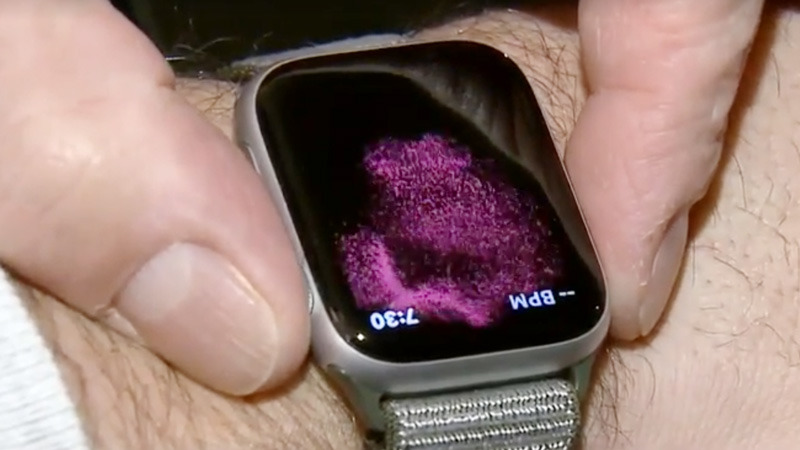A man from Nashua, N.H. says he is alive because Apple's latest Watch model detected atrial fibrillation — an irregular heartbeat.
Barry Maden originally bought the wearable because of its fall detection feature, according to his wife Tara. Maden earlier experienced a brain injury, and the couple was counting on the Apple Watch to help call 911 if he fell without anyone nearby.
To his surprise however, the Apple Watch eventually popped up a notification about his heart, prompting him to see a doctor, reports WMUR. At a hospital ER he was given a full-scale electrocardiogram, which confirmed the issue. His heart was restarted under sedation.
"It would've probably taken me longer had I not had something actually telling me that something's not right," said Maden, who noted that he initially thought he was just suffering from anxiety related to holiday travels.
The Series 4 is the first Apple Watch to have a built-in ECG feature. By loading a dedicated app and holding a finger on the crown, the device can act as a single-lead ECG.
Watch users don't strictly need a Series 4 to detect atrial fibrillation, since earlier models still have optical heart sensors, but ECG technology can provide better data.
Apple has been eager to market the Watch as a potentially life-saving accessory, calling attention not just to health and fitness but things like Emergency SOS calling.
 Roger Fingas
Roger Fingas


 Andrew O'Hara
Andrew O'Hara
 Wesley Hilliard
Wesley Hilliard

 Malcolm Owen
Malcolm Owen
 Marko Zivkovic
Marko Zivkovic

 Chip Loder
Chip Loder
 Christine McKee
Christine McKee




-m.jpg)




34 Comments
This stories will become so common they won't be news anymore.
After searching the Internet for "Series 4 ECG," Maden apologized for overburdening the health-care system. "I'm what's wrong with America," he said.
How can we be sure he wasn’t wasting that doctor’s time?!?!
/s
Sweet irony this news article came out a day after The Verge ran their hit piece.
This is, of course, just anecdotal evidence. It neither confirms nor refutes the hypothesis proposed that Apple Watch ECGs creating false positives will do more harm to more people than they will do good through true positives, as described in this story.
It’s also true that there doesn’t seem to be the anecdotal evidence turning up that would at least provide some support for that ‘false positives’ hypothesis. You would also imagine that for the ‘false positives’ hypothesis to have much chance to be correct, that there would need to be a pretty significant number of anecdotes turning up of people who experienced some sort of harm or at least temporary anxiety resulting from a false positive reading. This is because the amount of good as described in the story atop this thread is significant: a life saved, or at least a life-changing health crisis averted. To offset that, the harm to an individual with a false positive would either have to be just as significant (unneeded treatment resulting either in death or in a life-changing health crisis), or there would have to be a large number of people experiencing lesser, but still significant harm (e.g., large medical bills, or significant anxiety resulting from false diagnosis of ‘heart problems’).
So far, we’re not seeing those horror stories, and it seems pretty likely we would if there were any. Remember when Apple Watch 0 came out and a handful of people discovered that the pulse reader couldn’t see through dark tattoos? A tiny number of people experienced a problem and you would’ve thought that the Apple Watch was a complete failure and Apple was going to go out of business. Generally when there is even a small problem with an Apple product, there is a disproportionate if temporary uproar about it.